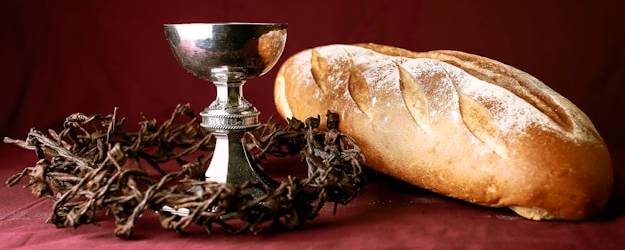
Question from the Reader: My priest at Mass said that the number of the Sacraments was not determined until the Council of Trent. I was told since I was a child in religion class that Our Lord Jesus established seven sacraments in the course of his earthly life. Who is correct?
Answer from Fr. Cush: Thank you for your question. It really seems like there are two questions here: first, did the Church always hold that there were seven sacraments, and second, did Christ establish the Seven Sacraments in the course of his earthly life?
To answer the first question, let’s begin with this statement: The fact that there are seven sacraments is part of the deposit of faith. However, in the history of the Church there were debates on whether certain other signs were sacraments or not. Remember, in the early Church the terms mysterion and sacramentum were, more or less, interchangeable and were used in a broad sense. Later, these would come to be called sacramentals. For Tertullian, there were five sacraments upon which he focused (leaving out Anointing of the Sick and Penance). In his writings, Augustine never mentions Anointing of the Sick; however, Pope Innocent I in 416 (Letter to Decentius of Gubbio) mentions that Anointing is a sacrament. Later, theologians such as Otto of Bamberg, Hugh of St. Victor, and Pope Alexander III affirm that there are seven sacraments. The massive influence of Peter Lombard reasserted that there are seven sacraments.
Some disagreed and asked a question that was on the mind of many in a medieval world — was the coronation of a king or a queen a sacrament? If we look back to King Charles III of the United Kingdom’s coronation, wasn’t he anointed? And this coronation was included in the Roman Pontifical from the eighth century! So, to say that there had been some confusion would be an understatement!
However, in 1274, the Council of Lyons states definitively that there are SEVEN sacraments in the Council’s Decree for the Armenians. The number seven is reaffirmed in the great and definitive Council of Trent. This was in reaction to some of the Protestant Reformation theologians, who claimed various numbers of sacraments.
So, exorcisms, holy water, the recitation of the Pater Noster, all were called sacraments at one time or another in the history of the Church. Later, these would come to be called sacramentals. (If one were to look at the Scrutiny Sundays in the Order of Christian Initiation of Adults, we would see all of these incorporated in the current Roman Rite!)
Now, this brings us to the second part of this question: Did Christ establish SEVEN sacraments? The answer, definitively, is yes! The sacraments become fully effective as they draw their efficacy from Christ’s sacrifice and resurrection. Only Christ has the power to set up these sacred signs and to give them power. As God, as savior of humanity, only Christ can offer the effects of his redemption to the individual and to the Church.
It is a defined dogma of the Church that each sacrament has been established by Christ Himself. (Council of Trent, Seventh Session, Decree on the Sacraments, Canon 1.) Modernists state that the sacraments “evolved” in the Church as a means of arousing faith (Lamentabili and Pascendi Domini Gregis). Fr. Karl Rahner, SJ, is incorrect when he claims that Christ only implicitly instituted some of the Sacraments, inasmuch as the Church is the primordial sacrament. (Theological Investigations, Vol. 4, 274)
With that being stated, let’s go to two further questions that relate to our reader’s initial question(s): What is a sacrament and what is a sacramental?
To begin with, we can say that the sacraments and sacramentals are distinct in their nature, purpose, and effects. Therefore, let’s begin with the seven sacraments:
By definition, sacraments are outward signs instituted by Christ to give grace. They are essential rites that confer the grace they signify. The number, as we have already indicated, is seven. In the course of his earthly life, the Lord Jesus instituted the seven sacraments. The primary purpose of the sacraments is to sanctify individuals, build up the body of Christ, and give worship to God. Sacraments are efficacious ex opere operato (by the very fact of the action being performed). This means that they confer grace when thesacramental action is performed, independent of the personal holiness of the minister or recipient.
Let’s now discuss sacramentals. By definition: Sacramentals are sacred signs instituted by the Church that bear a resemblance to the sacraments. They include prayers, blessings, actions, and objects that prepare individuals to receive grace and dispose them to cooperate with it. As regards number, there is no fixed number of sacramentals. They include items like holy water, crucifixes, medals, rosaries, scapulars, and actions such as blessings and exorcisms. The purpose of sacramentals is to sanctify different circumstances of life, to prepare people to receive the sacraments, and to increase devotion. In terms of efficacy, sacramentals do not confer grace ex opere operato. Instead, their efficacy depends on the faith and devotion of the person using them, and they work ex opere operantis (from the work of the doer). Finally, in terms of the institution of the sacramentals, they are instituted by the Church rather than by Christ. The Church can modify or add to them according to pastoral needs.
Thank you Father Cush. Your answers seem to me easy to understand. Thanks also for answering the call to the priesthood. Sincerely, Tom Showerman Fowlerville, MI